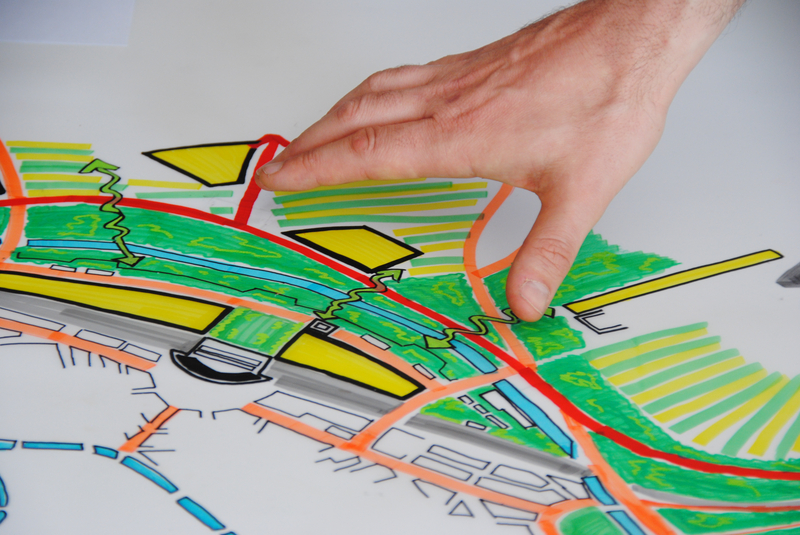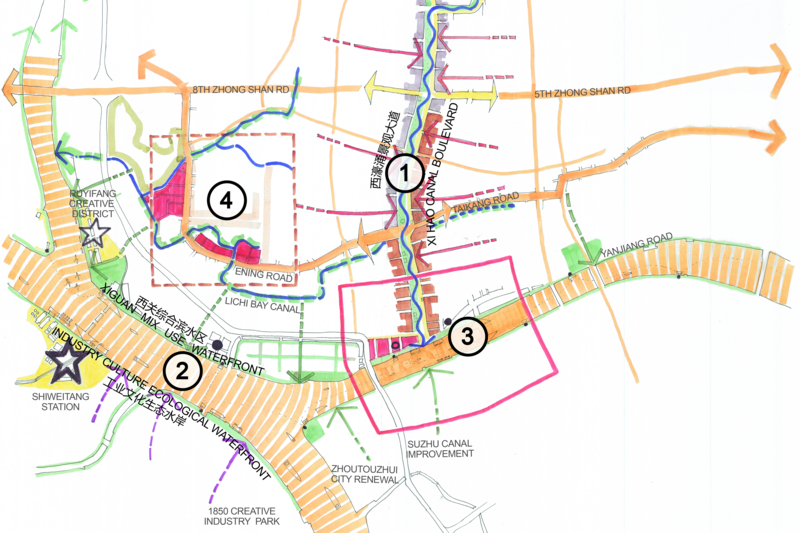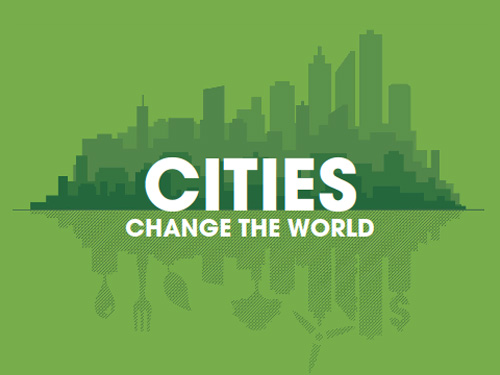Intelligence is collective, and urban planning is fundamentally collaborative. When faced with a complex, multi-facetted problem wouldn’t a sectorial solution be meaningless? This principle lies behind the idea of participative planning workshops. These temporary creative spaces of intercultural dialogue and co-design are invaluable instruments allowing cities and professionals to learn from each other in international contexts.
Two ingredients lie at the start of the process: an area –of whatever size– in need of transformation; and a development problem whose solution is not immediately clear to the client. Why not bring together, for a short period, a team of planners and designers who can take a fresh look at the site and the problem in hand? Their mission: to rephrase the questions and freely suggest innovative projects to help council officials move forward in their thinking. And what if that team were made up of professionals of all ages, with a range of different profiles (landscape architects, ecologists, mobility experts, artists, etc.) and from a variety of cultural backgrounds? Wouldn’t the responses be even more enriching? Different types of planning workshops exist, each with its own approaches, timeframes, and strengths1. In the French context, the Urban Project and Landscape Club workshops run by the French Federation of Urban Planning Agencies (FNAU) are based on two-and-a-half day sessions. The short length of the sessions creates a creative tension that catalyses solutions and grabs the attention of council officials around a single story told at different scales. The IAU (now L’Institut Paris Region) has developed similar formats internationally with one-week sessions involving local experts.
The sessions of Les Ateliers typically explore four different scenarios relating to a single question (one per team), fuelling discussions that take place among members of a high-level panel of international and local experts. The Urban Planning Advisory Team Workshops of ISOCARP leverage a diverse range of profiles within one team, whose members work together to build a single narrative with variations. However, these workshop studios share similar features:
- Their scope: opening up the fi eld of possibilities; encouraging discussion with project clients; changing local perceptions; suggesting strategies and tools for taking action; • Their principles: voluntary participation; collaborative intelligence; cross-disciplinary dialogue; creative freedom;
- Their methods: reframing questions; multi- scale thinking; transparent discussion and real-time interaction with the client (typically a public authority); hand drawing as a favoured means of expression (computers are switched off, at least in the first phase).
From the client’s perspective, the benefits of workshop studios are obvious: in addition to the local debate they help to fuel, they legitimise council officials and position the area in question. From the participants’ point of view, dealing with new issues, or old ones raised in different terms, broadens the scope of their experience. Some cities, such as in China, may use these workshop formats to “buy” international expertise they do not have and to promote their own models. But overall, the circulation of concepts, ideas and solutions for sustainable development takes place from South to North as much as from North to South (if these expressions are still meaningful today). They allow us to learn together.
Paul Lecroart, Senior Urbanist, L’Institut Paris Region
ISOCARP’S URBAN PLANNING ADVISORY TEAM WORKSHOPS
The International Society of City and Regional Planners (ISOCAR’P) has been running tailor-made workshops worldwide since 2004. For each Urban Planning Advisory Team (UPAT) workshop, a team of seven to nine professionals (a team leader, a team rapporteur, senior and junior planners) is set up for the occasion. The team is tasked with formulating creative solutions and strategic advice to the host area, over a short period (5 to 7 days). On the last day, the team presents the results to the stakeholders, then drafts a report which is presented at the association’s annual world congress in Jakarta in 2019. The aim of a workshop is to get off the beaten track and come up with simple, practical and original solutions that improve quality of life. These solutions, if selected, must be able to be implemented within five years. The workshops bring added value in complex situations that require seniority and experience, creativity and open-mindedness. They help raise awareness and make it possible to elaborate integrated spatial strategies, liveability trajectories, and ecological, social and economic approaches. One of the 2018 workshops focused on Guangzhou (Canton) and suggested four strategic action areas to foster the regeneration of its historic centre.
Martin Dubbeling, President of ISOCARP, the International Society of City and Regional Planners
To find out more: isocarp.org/activities/upats
LIFE IN METROPOLITAN AREAS IN THE 21ST CENTURY: A WORKSHOP OF LES ATELIERS
The format of Les Ateliers workshops has proven very successful since 1982 with ninety-five sessions held in dozens of places, including Paris (Île-de-France), Hanoi, Irkutsk, Tokyo, Porto Novo, Vitoria, Changzhou and Ouarzazate. Their impact can be huge, such as the change of location for the 2010 Shanghai Universal Exhibition. Life in Metropolitan Areas in the Twenty-First Century session: prepared by 100 experts over a period of two years, the 2018 Workshop in the Paris Region brought together twenty young professionals of thirteen nationalities. What they produced amazed the jury, who wondered: “What have we missed out on so that these young people can tell us so much?” The four teams looked into climate change, technological revolution and urban megacity growth worldwide through the prism of metropolitan lifestyles. Food represents a third of greenhouse gas emissions, so the Food and the city team reflected on the agricultural model and changing what we have on our plates. For the Seeds team, climate change means the future has been cancelled and we must change our lifestyles. Faced with such a diverse range of visions, interests, and territories, why don’t we start from the bottom by sowing seeds? The Micropolis team focused on metropolitan concentration and on social exclusion in the Paris Region. What matters, the team said, is connecting the larger geographical region with local community participation. The Time Revolution team explored the subject of work. What if we worked six hours a day, in different ways, with less commuting? What if, instead of running after work, it was work that followed us around?
Bertrand Warnier, founder of Les Ateliers, International Workshops of Planning and Urban Design, Jean-Michel Vincent and Solenne Sari, coordinators of the 2018 Workshop
To find out more: ateliers.org/en


